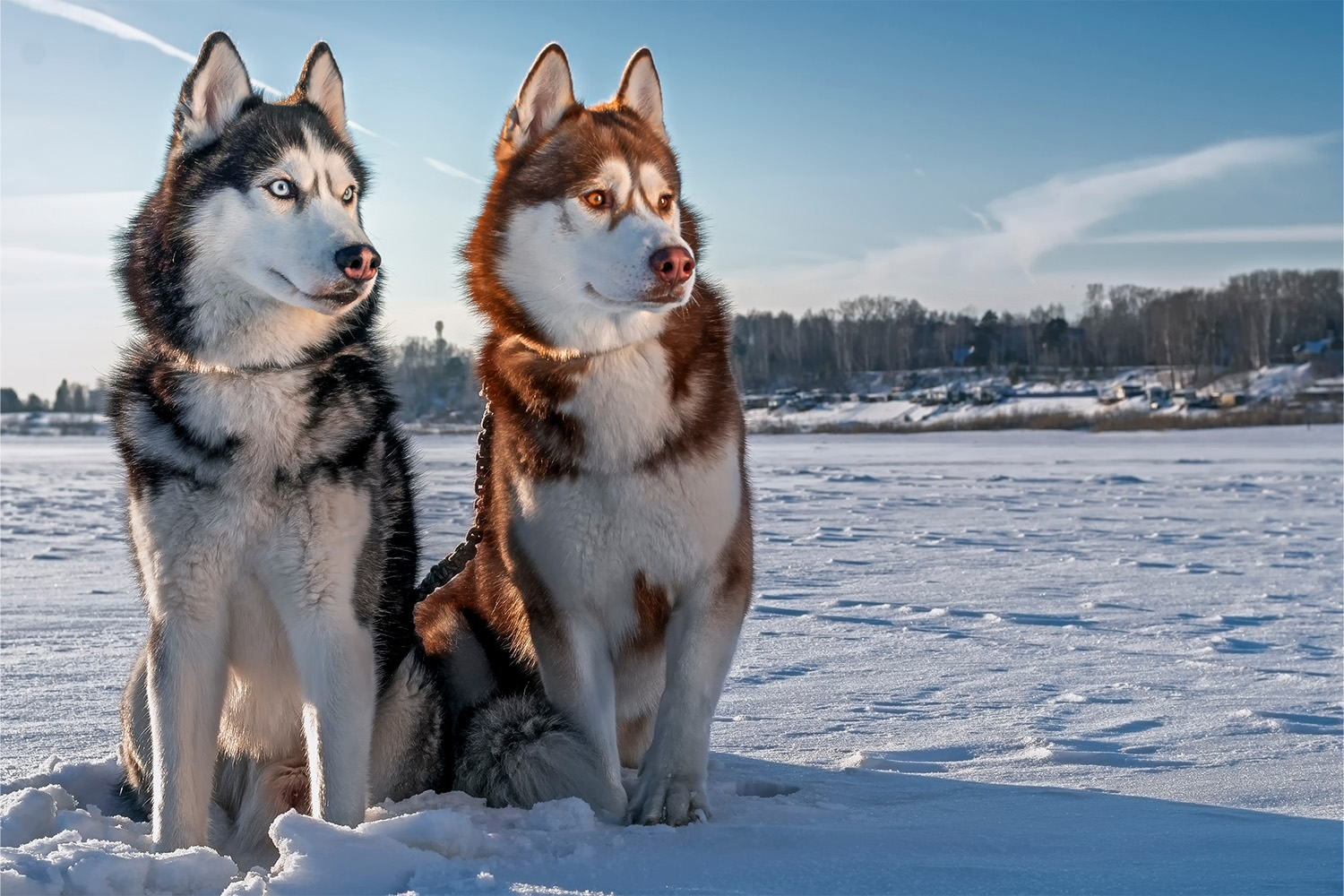If you live with a husky, you know what we are about to say… They LOVE to talk! It’s one of the things that you simply have to love about your husky because it goes without saying that your husky will have lots to say to you. They love to share their thoughts and feelings, and without doing so, they might as well drive themselves crazy.
You may be wondering why exactly this phenomenon occurs, as most husky parents will have very similar stories about their dog’s vocality. Both puppies and adults alike are known to be vocal, so it’s not something that changes over time.
Huskies communicate through a variety of sounds, which they might associate with certain needs. Sometimes your husky might be trying to tell you they love you, and other times they may be asking to be let out. Sometimes they simply demand attention, and talking or howling is the best way to get yours!
To learn more about why huskies are so vocal and why they rely on their vocality so deeply, keep reading.
The Different Sounds Huskies Make
Huskies don’t just make one sound — they are a whole orchestra. They have a variety of sounds that they might use to help get their point across better.
As their dog parent, you might be able to decipher their unique sounds to better understand what they are trying to get at. If you talk or howl back at your husky, you’re bound to get a response and will likely only fuel their talkativeness.
Each kind of sound does correlate to a specific meaning, and it is important to learn what they are so you can best communicate with your pup. A husky might howl, talk, groan, or bark to get your attention or during play, but each time it’s for a particular reason. Huskies don’t often make sounds to simply bark because they want to.
Howling
A husky howl is quite common and can begin happening as soon as puppyhood. You might start by prompting your husky to howl by teaching it to them with your own voice. Howling is a very natural sound for huskies and sounds long and drawn out.
However, this is usually a result of loneliness, and this crying can happen at night if your puppy is left home alone.
On nights out, you might receive texts from your neighbors asking if your husky is okay because they are making so much noise. Their howl can be long and somber sounding because they are trying to call out to their pack (AKA you) to call them home.
When left alone, howling is very likely to happen, but there are ways for you to teach your husky to stay quiet. If you crate-train your pup, you should start by leaving for short periods so that your husky learns that no matter what, you always come back for them. This might help to limit the amount of howling they do at night.
Howling is often related to separation anxiety, which many huskies do develop. They don’t like being alone; they are social animals, so loneliness does not look good on them. They may grow more anxious the longer you are away from them, and their howls are a sign of their longing for you to return.
Talking
Huskies are perhaps most famous for their talking capabilities. Of course, we don’t mean that they use actual words, but they use their voice to try to let you know they are paying attention to you.
Most husky parents have had a moment where they just fully conversate with their dog as if they can understand, with the dog chatting right back. This usually looks like short and quick barks at various frequencies, making it feel even more like a conversation between two friends.
When a husky is talking to you, it doesn’t always mean that they require something. Often, talking is just a way for your husky to let you know they love you and are trying to show affection. For those who think it’s annoying, find a way to reframe how you view all the noise because it’s probably not going to stop.
Groaning
Huskies also are known to groan when they are super happy or looking for some attention. You might be giving some good belly rubs to your husky and stop for a brief second, only to be pawed and groaned at. Groaning isn’t something that you should be worried about, and it rarely means that your husky is feeling discomfort or pain.
It’s more likely that your husky is overjoyed and not sure how to contain their excitement.
Excitement Barking
In addition to excited groaning, your husky might participate in excited barking. This happens when your husky becomes overwhelmingly excited and happy and can’t contain that energy. They might bark at you excitedly when you are preparing to take them out on a walk, when they realize they are about to enter a dog park, or when their grandparents come for a visit.
This kind of vocality is related to happiness, but it can be very loud and all-encompassing. It might be best to teach your husky that barking is to be kept to a minimum while inside. They can use their “outdoor voice” in the yard or dog park, where they can vocalize as loud as they want, for as long as they want.
Why Do Huskies Vocalize?
Huskies vocalize for a variety of reasons. You might begin to learn what each sound and frequency mean specifically for your husky as you learn about their behaviors.
All huskies are one of a kind, but it’s deeply ingrained in them to use their voice. This can be a great tool to have as it is a way for you to understand your husky’s needs and ensure they are comfortable and happy.
It’s something that all huskies do, so it’s best to learn about why they do it to prepare yourself for it.
Communication
The most common reason a husky is barking in your face and trying to have a conversation is that they are trying to tell you they need something. They might want to play, go on a walk, want food, need more water, look for a toy that got stuck underneath the couch, think they heard something on the roof… and the list goes on.
Sometimes you might be able to tell right away what it is your husky needs from you, but it’s not always obvious. As you become more confident with your husky translation skills, you might be able to put together the pieces of what your pup needs.
Pay attention to timing, location, and the kinds of barking or howling. Likely, this will point you toward a solution.
Reactionary
Huskies also bark as a reaction. When they see something that surprises them, they might let out a few barks. If they think they hear someone at the front door, they might begin to howl. Huskies might hear sirens or babies crying and respond to them. This is because the sounds might signal distress for huskies, and their first reaction is to make noise back.
These sounds might be reminiscent of a lost member of the group trying to find their way back home, so your husky lets out a howl to help triangulate their location. This is very common, especially because dogs can hear noises that the average human cannot.
Ancestry
Huskies are known as pack dogs, specifically within the sled dog community, and have been around so long they are considered an ancient breed. They are used to being around their pack and having to communicate from far distances.
Howling, talking, and barking are all ways for your husky to communicate with their group. When they are removed from that, you become their family!
It’s in their nature to be vocal because it helps them survive. Some traits have been passed down genetically through generations of animals, and for huskies, vocality is one of them. This is the way that most huskies stayed alive and safe before becoming domesticated, and it’s one of the traits that have stuck around.
Make Some Noise: AskVet
Having a husky means you really need to be on top of your game. They are energetic, active dogs who need a lot of care and attention to thrive. They deserve proper care and love and a parent who wants to provide them with all that they need.
Questions will come up when you have a husky, especially as you try to learn more about your own husky’s behaviors and needs. With AskVet, you can get answers immediately from Certified Pet Lifestyle Coaches™, who will work with you to better understand your husky. You don’t have to worry about raising your husky on your own: Sign up, and we can help ASAP!
Not everyone is lucky enough to have a dog that tries to communicate every single second of their day to their human. You will never have to worry about whether your dog is okay because your husky will definitely let you know!
Sources:
Frequency Hearing Ranges in Dogs and Other Species | Louisiana State University
How to crate train your dog or puppy | The Humane Society of the United States
How far away can dogs smell and hear? | University of Adelaide





